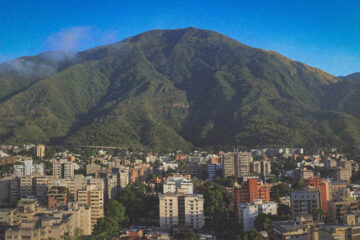April is upon us. The first quarter of 2022 has come and gone like a flash. Things sure are messed up all around the world, and yet, despite all the chaos and uncertainty I’ve never been this hopeful for my future — remember, no doompilling this year!
It’s been now two years since the Venezuelan regime declared a state of emergency due to the COVID-19 Pandemic, while this state of emergency is technically still in place, life has all but returned to our accustomed normalcy in almost every regard. Some things remain in place, such as a limited international flight schema, social distancing in public offices, and masking.
New ads now exist in Caracas’ highways, coexisting side by side with the political ads of the regime. It’s still a bit surreal to see ads about stores, cryptocurrencies, and concerts coexisting side by side with giant ads of the Supreme and Eternal Commander of the Revolution reminding you that it is ‘time for loyalty.’
A full return to classrooms was decreed about two weeks ago, and while most of our educational infrastructure is in shambles, children are once again back in those classrooms learning.

Certainly so, deficient education is better than no education, and ours took a turn for the worse during these two years of pandemic, don’t forget that not everyone has access to adequate hardware and stable internet to partake in e-learning, and that made partaking in online classes a hard (sometimes impossible) endeavor to many in this country — my own young cousins can attest to that.
Traffic jams once again are the bread and butter of Caracas’ life, a characteristic sign of the chaos that the Capital District of Venezuela can and will brandish upon you. The one thing that was really missing from them was the added traffic of school transportation and now we’ve once again have that icing on the cake.
On the subject of gasoline, it remains as-is: Subsidized gasoline is hard to come by at times and it always involves long lines. The gas stations that carried this subsidized fuel are less with each passing day, an tacit yet tangible sign that it’s being slowly phased out.
Non-subsidized gasoline (which goes for $0.5 per liter) can be found almost everywhere in this city. Now that our family vehicle is in somewhat working condition, I can now partake in this new Venezuelan passtime of refueling lines, with the extra spicy caveat that the fuel gauge on my mom’s car broke and I never know how much gasoline I have left, so I’m always driving on the edge.
Banks have fully reopened their doors, and so have most Venezuelan public offices. If you miss and yearn for all that social distancing rules and etiquette, then look no further at these places, as I said at the start of this post, that’s where it’s still being applied for the most part.
With the Holy Week right around the corner, we’ll have a brief respite on traffic, and the city will be a bit calmer during these important days of our Catholic faith.
The country’s minimum wage received a substantial boost last month, a 1,757% raise to be precise. Now, hold your horses because that percentage raise, as impressive as it may look on paper, still amounts to $30 per month, or $1 per day on average. Private sector wages are noticeably higher, but still average $90 per month, some places pay more, others pay less.
In spite of these wage improvements, and despite what the narrative of a ‘fixed’ country tells you, people are faring the same in terms of economy and finances. We’re officially out of the out of control hyperinflation spiral that crushed us for years, and according to the regime’s official data, February’s inflation was about 2.9% and March was 1.4%. The regime is burning through money to keep the exchange rate frozen, for what it’s worth, it has forestalled the decline of the latest iteration of the Bolivar — for how long? I really can’t say.
The above-mentioned numbers are ‘official’ data, though, and they’re heavily contrasting with what other sources say, which have last month’s inflation measured at 10.5% — this is the one I’m more inclined to believe, not because of pessimism, but because it’s more realistic considering that every month I spend more to buy the same amount of food.
Foreign currency, the eternal lifesaver, isn’t as strong as it used to be, and because of inflation it’s purchasing power has surely been reduced. To make matters even more complicated in this already complicated country, all foreign cash and cryptocurrencies are subject to a brand new “Great Financial transaction” tax, currently set at 3%.
That means that if you pay with foreing cash or crypto you have to pay 3% more than when paying with Bolivars or the regime’s Petro crypto. If you also count the current Value Added Tax rate of 16% + this new 3% tax then you’ll realize that for every $100 that you spend (regardless of whether you’re a local citizen, tourist, or what have you), the regime gets to pocket $19.
This tax, or rather, the way it’s worded and implemented, has left everyone scrambling lately. You’d think it’d be a simple tax with a simple implementation but no, nothing is as straightforward here. The tax needs to be calculated separately on a bill, which means that stores have to spend money updating and patching their sales softwares, as well as readjusting the mandatory fiscal printers that you have to use. These fiscal devices usually go for $1000, and many smaller stores can’t even begin to afford all these devices and software updates, there is no such thing as credit in this country anymore either (my local bank’s credit card limits are about $30 or so, why bother at that point) so that’s out of the question.
Everyone was given such a short amount of time to implement the necessary changes, and every store has to start filing them soon through an absurdly complex schedule determined by the last number of their respective tax ID number.
We’ve long since started marking up prices in USD as ‘reference’ prices, but the new tax’s nuances now present scenarios where if you have a $10 bill, and want to buy something that has a price tag of $10 (VAT included), then that $10 bill alone won’t be sufficient to buy that particular item, as you have to pay the extra 3% tax.
Payments using foreign credit/debit cards are exempt from the tax because the payment is done with Bolivars — your bank will charge you an exchange fee commission, though.
A substantial amount of payments and pretty much all private sector wages are now paid in foreign cash. Factor whichever real inflation rate we have right now, add the new 3% tax on foreign cash (which the regime has now the prerogative to raise up to 20% whenever they feel like) and it’s all the same: Your purchasing power noticeably diminishes every month.
Other than that, it all remains the same down here. Water remains my biggest nemesis, power is flaky at times (blackouts still often occur outside of the Capital so I can’t complain), and inflation is well, inflation (unless you actually believe the official statistics, lmao).
It’s still a bit hard to write new things about the country and its developments because, for better or worse, we remain in stagnation.
The average Venezuelan life continues to be based around wrestling all of the country’s shortcomings and their respective personal struggles, keeping on keeping on to the best of one’s ability while fully aware that there won’t be a regime change anytime soon, because that ship sailed long ago.
Everyone has their own solutions to keep fighting against the unwinnable foe that is Venezuela, whether it is to stay here, or leave — that’s where I remain focused on.
I’ve spent most of the past two months preparing all the documents I need for my upcoming Italian Consulate appointment while being constantly anemic and sick. On the former I’ve made substantial progress and I’m currently on a lull period courtesy of the eternal Venezuelan bureaucracy, because of it, I must wait until April 20th and May 07th to continue.
On the latter, my health is finally picking up, I’m no longer feeling that anemic as of late and I’ve even begun to repay all the sleep debt that I owe to my body — baby steps, but I definitely intend to get in shape and just healthier overall. I will say this though, I had forgotten how great sleeping more than 2-3 hours felt like.
Would that I could expedite all this paperwork and have the two folders ready by now, I would, but Venezuelan bureaucracy is a beast that no one can defeat. After the April and May appointments I’ll have one extra step and that’s about it. I’ll certainly make a separate post updating my current status with all of this, for those interested. There is one document I won’t have ready on time, but I hope it won’t be an issue.
In the meantime, I’ll try to focus more on my health throughout this month, as well as pushing more content, such as more posts, more memes, and more projects, as well as working on my novel(s). I still fully intend to publish Sword sometime this year, work on Sins has been too slow for my likings, I’ve just been too time constrained with all the document gathering stuff and being sick.
Hope everyone has a great month of April, and a fantastic rest of 2022 for that matter.
Until the next one,
-Kal


